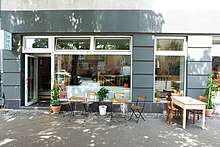Anti-café
An anti-café (sometimes called a pay-per-minute café or a time club) is a venue that offers working space, food and drink, where customers only pay for the amount of time they spend in the establishment. Anti-cafés became popular around 2011 in Russia and some CIS countries, with further independent anti-cafés opening across the world. Anti-cafés include the Ziferblat chain, founded by Russian writer Ivan Mitin in December 2010 in Moscow,[1] the "Slow Time" cafe in Wiesbaden opened in 2013,[2] and "Dialogues" in Bangalore.[3]

The anti-cafe concept mostly targets entrepreneurs, digital nomads, students, and creatives who need a cheap and convenient place to get their work done and meet other professionals.[4] Spaces can also be used by companies as a place to organize presentations and press conferences at low cost.
Operation

Customers at an anti-café do not pay directly for what they drink and eat, instead paying for the time they spend in the space, typically on a pay-per-minute basis. They may help themselves to coffee and tea, snacks, and desserts in that time. As well as food and drink, anti-cafés may offer board games, libraries of books, coworking facilities, wireless Internet access, films, and video game consoles.[5] Services vary according to spaces, with some offering lunch or brunch meals.[6]

Although all anti-cafes work on the "pay for your time" basis, pricing systems vary. L'Anticafé in Paris operates on a pay-per-hour basis where customers are asked to pay €4 for the first hour and €3 for every subsequent hour, or €14 for an entiree day.[7][8] Others adapt a pay-per-minute method – be'kech[9] charges 5 cents per minute that includes a selection of drinks and lunch, or an entire day for 15€. An anti-café in Bordeaux uses a hybrid model of charging a fixed fee for the first hour and by the minute beyond that.[10]
See also
- Tea room
- Internet café
Related articles
References
- Bert van Pool (24 October 2014). "A Trend in European Cities: The Anti-Cafe". The Huffington Post. Retrieved 12 November 2015.
- "'Time is money' in new Wiesbaden café". 27 May 2013. Retrieved 28 June 2018.
- "We Tried Out The New Bangalore Cafe Where You Pay Only For The Time - OfficeChai". officechai.com. Retrieved 28 June 2018.
- "We Tried Out The New Bangalore Cafe Where You Pay Only For The Time - OfficeChai". officechai.com. Retrieved 28 June 2018.
- Poll, Bart van (2014-10-24). "A Trend in European Cities: The Anti-Cafe". Huffington Post. Retrieved 2017-07-11.
- "be'kech - Berlin's First Anti-Cafe and Coworking Space". be'kech. Retrieved 2 February 2020.
- "Paris: AntiCafé offers coffee and Wi-Fi for €4 | EuroCheapo". EuroCheapo's Budget Travel Blog. 30 June 2014. Retrieved 2 February 2020.
- "'Time is money' in new Wiesbaden café". 27 May 2013. Retrieved 28 June 2018.
- King, Megan. "Berlin's First Anti-Café Opens Its Doors". Culture Trip. Retrieved 2019-01-30.
- France, Connexion. "New cafe charges customers by the hour..." www.connexionfrance.com. Retrieved 2 February 2020.